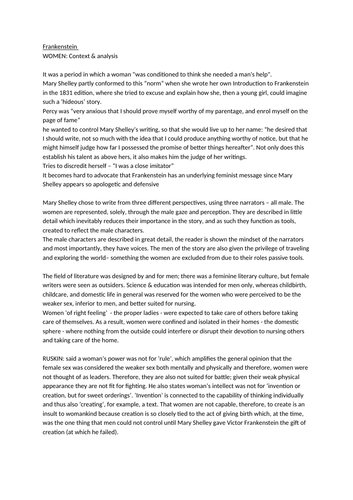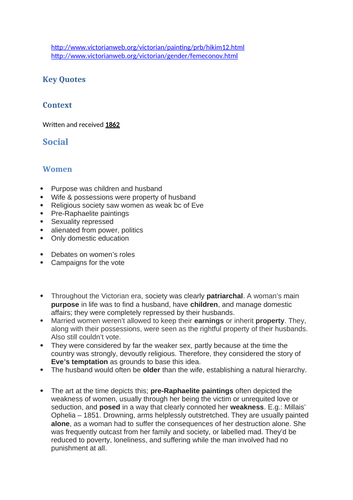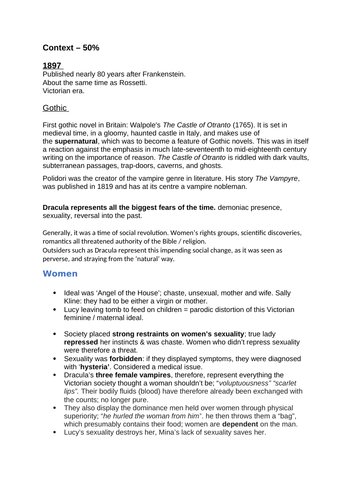94Uploads
16k+Views
2k+Downloads
All resources

The Bloody Chamber The Lady of the House of Love Lesson
Planned for an A Level lesson, appropriate for students who have never read the text before.
Covers comprehension, key quotes, memorising tasks, context, and critical theory. This can be linked to analysis and context for top band answers. A slide for essay writing practice is included.

Grade 9 Checking Out Me History Lesson (With Comparison to London) Power and Conflict AQA
This lesson covers key content for the poem, three carefuly chosen quotes with steps that students can use to easily analyse them as well as prepared notes, extensive analysis and exploration of context, example comparative points to another poem from the anthology, as well as a writing frame to support all students and make the comparison paragraphs easy work.
Key vocabulary, terminology, and paragraph structuring is included, as are opportunities for students to mark and improve their own work through target codes.
Quotes include:
“Blind me to my own identity.”
“Dem tell me bout de dish run away with de spoon
but dem never tell me bout Nanny de maroon”
“But now I checking out me own history
I carving out me identity”
Works towards:
How do the writers in London and one other poem present identity

Grade 9 Natural Order in Macbeth Essay (Act 4 Scene 3, and whole play)
A top band, Grade 9 essay on the question of: “Starting with this extract (Act 4 scene 3), examine how Shakespeare presents the natural order”.
Full mark model to be used for revision, notes, or lesson examples.
AQA and Edexcel suited, and written specifically for the AQA GCSE English Literature mark scheme. Key quotes, thesis statement, top tier context, and multiple supporting quotes are included.

Frankenstein Comprehensive Notes
A full set of notes on all key elements of the book. Discusses context, the role of women, an analysis of narrative, egotism, the creature, science, and more.

Robinson Crusoe and Pamela 18th Century notes
Analysis of the two texts, as well as very detailed summaries and quotes from critical interpretations.

Rossetti Notes
Includes poetry and context; social and personal context, including women, religion, etc.

Gothic Themes
A list of all common Gothic tropes, with bullet point notes on things that could be discussed within each theme.

Dracula Contexts & Interpretations
Notes on the key contextual events of Dracula’s setting, and time of writing. Also includes key critical opinions and quotes.

Notes on Shakespeare's Sonnets
Grouped by theme, these notes look at the most significant of Shakespeare’s sonnets, picking out key examples and quotes.

The Bloody Chamber Context Lesson / Notes / Revision
A Grade 9 context lesson, covering everything required for the OCR A Level English mark scheme, to help students reach top marks in an easy to understand, simple format.
This lesson covers key Gothic context throughout the centuries, using direct quotes from critical theorists and a modern, simplified explanation.
Made for The Bloody Chamber A Level OCR spec, but suitable for any work on the book.

Malcolm Kingship Lesson Act 5 Scene 8 Act 4 Scene 3
Macbeth GCSE. This lesson covers a summary of his character, possible extracts with prompt questions for student thought or discussion, critical theorists and relevant quotes surrounding Kingship, a quote recall task, as well as a writing frame to support all students.
Key vocabulary, terminology, and paragraph structuring is included, as are opportunities for students to mark and improve their own work.
Writing task: Starting with this speech, explore how Shakespeare presents the theme of Kingship in Macbeth.

Romeo and Juliet Essay Plan - Juliet Essay Plan GRADE 9
A full landscape sheet of key quotes, analysis notes, contextual facts, secondary supporting quotes, and grade 9 thoughtful, critical ideas.
This could be used for revision, or given to students to help them write a practise essay on Juliet’s character.

My Last Duchess Lesson AQA GCSE (With Comparison to Ozymandias) Power and Conflict AQA
This lesson covers key content for the poem, carefuly chosen quotes with steps that students can use to easily analyse them as well as prepared notes, extensive analysis and exploration of context, example comparative points to another poem from the anthology, as well as a writing frame to support all students and make the comparison paragraphs easy work.
Key vocabulary, terminology, and paragraph structuring is included, as are opportunities for students to mark and improve their own work through target codes.
Quotes include:
“Looking, as if she were alive.”
“gave commands” “all smiles stopped”
“Her looks went everywhere”
Works towards:
How is the abuse of power presented in My Last Duchess and one other poem?

Grade 9 Ozymandias Lesson Power and Conflict AQA
This lesson covers key content for the poem, three carefuly chosen quotes for students to independently analyse as well as prepared notes, extensive analysis and exploration of context, example comparative points to another poem from the anthology, as well as a writing frame to support all students and make the comparison paragraphs easy work.
This lesson works well as the first in a sequence, so I have also laid out the exam structure and total list of poems students will study.
Key vocabulary, terminology, and paragraph structuring is included, as are opportunities for students to mark and improve their own work through target codes.
Quotes include:
“I met a traveller from an antique land”
“Two vast and trunkless legs of stone”
“Half sunk, a shattered visage lies”
“frown, And wrinkled lip, and sneer of cold command”
“y name is Ozymandias, king of kings:
Look on my works, ye Mighty, and despair!”
Works towards:
How does Shelley present the power of humans in Ozymandias?














